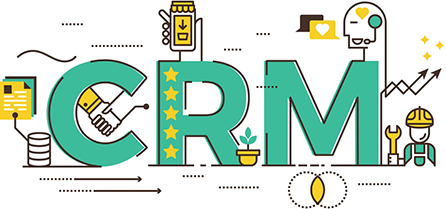Choosing The Right CRM Partner – 10 Questions To Ask
 Like most technology investments, picking the right software provider will have a major impact on the success (or failure) of your CRM implementation.
Like most technology investments, picking the right software provider will have a major impact on the success (or failure) of your CRM implementation.
The CRM software market is mature, so whether you are considering using Workbooks or one of our competitors such as Salesforce.com or Microsoft Dynamics, you will find that most solutions provide a rich set of features. To truly differentiate them, you will need to look beyond the product features.
At the same time, CRM is about more than just technology. It is about culture change, process development and people empowerment, and so the way that your software partner works with you is at least as important as the product functionality it offers.
Here then are ten questions to ask yourself to make sure you pick the right CRM software provider for your business.
1. Do they have experience of working with companies of your size?
The CRM requirements of SMEs is different to that of large corporates. They have different objectives for their CRM deployments and face very specific challenges. Pick a CRM partner that specialises in working with large corporates and they may have more features that you need, teams of support professionals, and a track record of successful implementations for a host of household names, but you may soon discover that they fail to understand you and your business.
Look for a provider that can show you evidence of successful implementations at similar companies.
2. Will they take time to understand your business?
CRM systems are there to enhance business processes. The first step to doing that must be to gain a full and clear understanding of your organisation’s objectives, culture, people, challenges, customers and so on.
So ask them how they will do that, and ensure they give you a convincing answer. During the sales process they should already be able to demonstrate a good, if not complete, understanding of the specifics of your business. If they look unconvincing at this stage, then alarm bells should ring.
3. Have you seen a realistic demonstration of the software in action?

All too often software demos are all singing, all dancing showcases of all the latest features. It dazzles and amazes, but is actually far less useful than a demo that is focused specifically on the needs of the company in question.
So brief your potential vendor on what you need the software to achieve and expect them to show you a tailored solution. Make it a hands-on demonstration where you are seeing exactly how easy it is to operate the system.
4. Do they communicate effectively?
A CRM implementation is a complex, iterative, and important process. It is essential that everyone involved communicates clearly and frequently. So ask how they will communicate progress to you and your team.
This is partly about the formal methodology they use, but is also about the informal contact that takes place as the project unfolds. Assess how well they explain complex concepts – do they help you understand, or are you left more confused?
5. Will they integrate with your existing systems?
A CRM system should sit at the heart of a business’s operations. It should be a central point for all the other systems from marketing to sales, HR, finance, customer service, and so on. Yet not all CRM software will integrate with your existing systems. Far better to discover this at the selection stage than once you have signed on the dotted line and find you need to invest in another piece of software.
6. Will they help you identify the resources you need?
Vendors should be able to provide guidance on the level and type of resources required to ensure successful implementation and adoption. What skill sets will be needed to scope your requirements and drive the CRM project? You’ll need to consider areas such as project management, data management, business analysis and much more.
They should be able to identify gaps you may have that could impact the outcome. Don’t be fooled by “Trust me it will be easy.” CRM is a wide reaching project and will require a detailed review of resourcing on both side and a clear agreement of who does what. Expect your potential vendor to guide you in that process – they are the CRM expert after all.
7. Do they have adequate resources and how will they support you?
Ensure you see evidence that their design, implementation, training and support teams are adequately resourced in terms of both technology and people. You are making a significant investment here, and you need to be confident that the partner you choose will be able to deliver as promised.
Bear in mind too that once in place this CRM package will probably drive growth in your business, and so your needs are likely to grow. Will your partner be able to grow with you?
Vendors vary considerably in the level and type of support they offer around design, set up and user training. To some extent this is a function of the amount you spend so come to the table with a good idea of how much work you are prepared and able to do, and what sort of budget you can afford to allocate here.
It is also about the style of training that will work best for your team. Should it be on-site or remote? Will they train an in-house trainer? If you need telephone support, will it be available during your business’s hours of operation? Do the support agreements cover unlimited support or only a limited number of hours?
8. Is it a stable business?
 The CRM software market is dynamic with many start-ups emerging all the time. Appealing though these new faces may be with their innovative techniques and cutting-edge technology, it is worth considering the value of longer-established players.
The CRM software market is dynamic with many start-ups emerging all the time. Appealing though these new faces may be with their innovative techniques and cutting-edge technology, it is worth considering the value of longer-established players.
Not only can they point to a track record of success with happy clients, but they may also have more solid financials. An ongoing support contract is of little value if the company providing the support no longer exists.
9. Do they have positive references?
Insist on speaking to one or two of their clients that are similar in terms of size, location, sector, and business challenge to you. Then, consider going further. Looks for user reviews and ask around your network if anyone has experience of working with the software provider. Note down some of the names they reference during the sales process and potentially pick up the phone to them.
10. Do you like them?
Finally, there is this entirely subjective, but valid question. You can tick all the objective boxes above, and you can hear the views of other people. All are important but it is also important that you will enjoy working with these people. Remember to look beyond the sales team. Spend time with the people who you will be working with on a day-to-day basis. Meet with the senior management and evaluate their commitment to your business.
If they satisfy all the above criteria and feel like a good fit for your organisation they probably are. Congratulations – it’s time to reach for your pen and sign on the dotted line. You have just found the CRM software provider that is right for you.